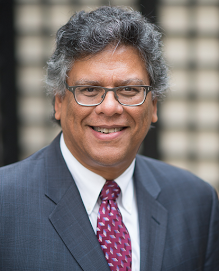 FROM THE CEO & PRESIDENT
FROM THE CEO & PRESIDENT
FEBRUARY 2021
As part of building wealth in household balance sheets, the real wage problem in America needs to be addressed. A low wealth household that cannot meet living expenses on earned wages is not in a position to build savings or assets. Approximately 44% of households, before the pandemic, could not cover their family living expenses without economic insecurity or incurring recurring debt. This limited their ability to build most assets. The pandemic made all of this more dire. Promising strategies include increasing wages, providing a monthly no-strings-attached guaranteed income to Americans, and removing age limits on Earned Income Tax Credit (EITC). Together, these income initiatives will increase basic economic security and help foster an economy that values a household having disposable income to enable steady wealth building. But income to enable economic security, while necessary, is not sufficient.
Discussions among AFN members and other stakeholders, including the Federal Reserve Bank, continue to refine the focus on equitable wealth building for low wealth households. Honest acknowledgement, even of factors not in our direct spheres of influence, is essential to fostering a different reality reflecting our values of a country with more equitable wealth distribution.
Achieving an economy that affords equitable wealth building requires intersectional solutions—an effort led by many funders. It requires us to keep asking uncomfortable questions and learning as we seek and test products, practices, and policy solutions.
- How do we meaningfully dismantle the drivers of the racial wealth gaps?
- What lasting changes need to be acted upon to address the wealth inequities revealed by the pandemic?
- What is needed to explicitly eliminate the overlay of gender wealth disparities?
- Can we eliminate embedded racial bias in philanthropic decision-making policies and practices?
- Do we agree on the shared values establishing why we need to achieve racial and gender equity and economic mobility reflecting asset building?
- Will funders have the staying power to achieve long term wealth impacts?
The policy environment is thankfully changing at all levels allowing more and new opportunities for action.
At AFN our shared goal is to increase wealth and economic mobility equitably recognizing there is so much more to do. Can we confront past federal government policies that broke promises and denied wealth opportunities to Black and Native Americans by supporting financial reparations? Can philanthropy invest more to advance the developing model and narrative from a justice lens to result in meaningful cash damages from the federal government to correct their past wrongs? Can philanthropy then act to help ensure the tools and systems are in place to achieve racial wealth building equity?
Funders are primed to emphasize equity and invest in shaping the fundamental systemic reform required to level the playing field. The dominant economic theories of the last 40 years, still embraced in many narratives, deregulated capitalism as a mantra, divorced productivity from wages, shifted local taxes to fees and fines, berated government efforts to advance equity, moved tax policy upside down, and disabled tax collection which allowed the wealthiest to avoid taxes on income by underreporting income not subject to automatic withholding (according to the Internal Revenue Service). Can we all finally agree that these policies have failed by making most Americans vulnerable?
Moreover, tax benefits simply do not need to remain primarily restricted to the wealthy. I understand that tax policy reform does not sound exciting to some funders; yet, it is critical to advancing equity. Currently, trillions in tax subsidies support retirement and homeownership; these subsidies primarily reward high wealth White tax payers instead of the majority of tax payers who do not itemize. At the same time, the IRS did not collect an estimated $600 billion in taxes last year. And the “disproportionately responsible” for this uncollected revenue were the high net-worth wealthy.
Can’t we agree that taxes should be collected fairly? If so, can the revenue support equitable wealth building, reduce debt from higher education, and fund baby bonds? Yes, in fact, unpaid taxes total more than all the income taxes paid by the bottom 90% of American taxpayers. Rethinking tax subsidies to incent equity offers more revenue.
Identifying revenues and equity based policies can help us imagine better futures, e.g. addressing retirement, scaling retirement solutions like auto-IRA in more states, and eliminating the income cap to capture Social Security contributions on all earned income. Philanthropy will be needed to offer officials the cover of facts and economic modeling, the pressure of public opinion formed through narrative change, and the effective advocacy and lobbying necessary to achieve tax policy that supports equity and economic mobility instead of the present course.
Finally, embracing equity helps shape the inevitable movement to a greener economy. The coming clean energy transition, that more and more in the corporate world are acknowledging, represents a major opportunity for accessible, inclusive employment and small business development. How can philanthropy foster a clean energy workforce and small business pipeline that achieves disproportionate inclusion of women and people of color? To realize an equitable economy that is much greener, significant philanthropic investment will be needed to ensure the necessary investments in workforce and business and government policy changes occur.
AFN members lead by not only developing ideas, but by testing and investing in scaling, narrative change, and advocacy to reform public policy priorities. The members of AFN are engaged on many levels. Join AFN to help learn, teach, and advance equity.


